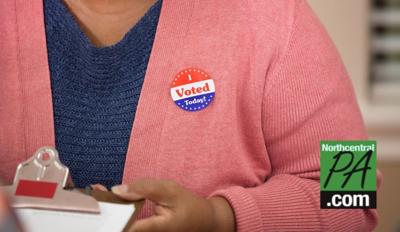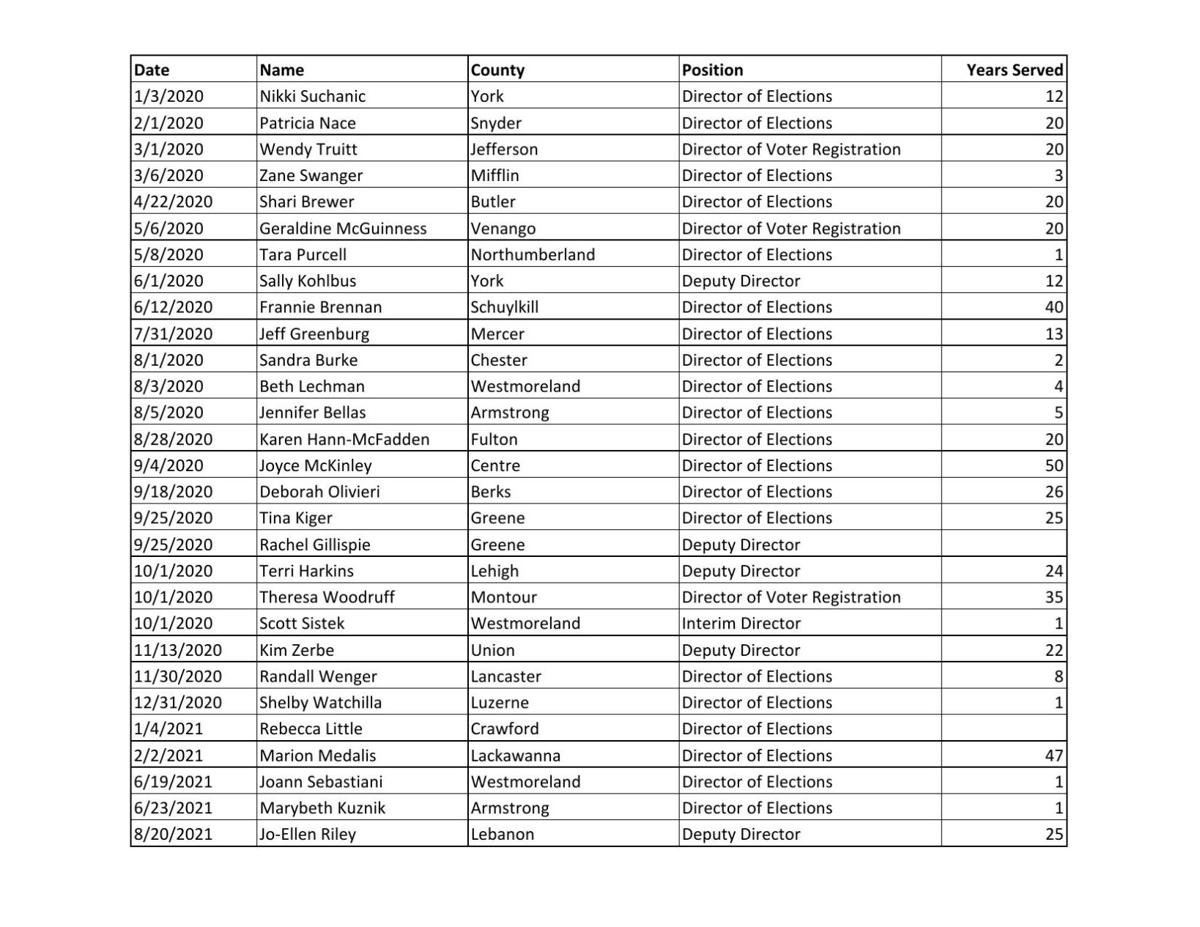Williamsport, Pa. — Over the last two years, a confluence of factors has led to the departure of nearly 50 top election officials across the state.
In Pennsylvania, the passage of Act 77, the COVID-19 pandemic, and the attempts to overturn the 2020 presidential election have stressed election offices to their breaking points.
Act 77 was passed in 2019 and is a law that provided universal access to mail-in voting.
These 48 departures represent either directors or deputy directors in county election offices making up over 600 years of combined election experience, according to Lycoming County Director of Elections Forrest Lehman, who has tracked these departures over the last two years.
The Pennsylvania Department of State says there have been more then 50 departures, but notes some of these were due to retirement.
While Lehman says he'd seen two to three retirements annually since taking his position in 2013, the number of departures in the last two years has outpaced that of the previous eight.
Lehman did say he wouldn’t claim his methodology is 100% accurate, but that’s because he “probably missed some things.”
“If anything, I’m undercounting it,” Lehman said. “Most of [the departures] you can independently verify through local reporting.”
The issue is broader than just Pennsylvania. Accusations of election fraud have pushed a significant number of election workers to their breaking point, prompting many to quit, according to ABC.
Last year, Reuters identified over 100 threats of “death or violence” directed at election officials across the U.S. since claims that the 2020 election was stolen.
The report called it an “unprecedented campaign of intimidation inspired by Trump’s false claims that the 2020 election was stolen.”
The number of changes made by Act 77 contributed to many inside election offices departing as they didn’t “want to take on the challenge of implementing that many changes in that short a time,” Lehman said.
Lehman said that Act 77 had already stressed election offices prior to the pandemic, and COVID “exacerbated the changes that Act 77 had set in motion.”
According to Lehman, COVID quickened the change in behavior from voters that was already expected to come from universal mail-in voting contributing to staff burnout.
“It caused a lot of loss in staff,” Lehman said.
Lehman also said that COVID caused a lot of difficult in staffing precincts with poll workers, who are volunteers. In Lycoming County, poll workers are paid $120 for every election day worked.
"Some counties had it worse then others," Lehman said. "I think we got off better then most, but I did have about six or seven precincts, in the spring of 2020, that just got wiped out completely. All of them quit."
Lehman said they're in better shape now, but a "ton of recruiting" had to be done.
The right-wing pressure campaigns to overturn the 2020 presidential election further pushed people to their breaking points.
Lehman said that some counties in Pennsylvania had the entire elections office leave after the 2020 election.
“It made people wonder, ‘Why am I doing this?’" Lehman said. “’I’m trying to focus on future elections, but we keep getting dragged back into discussing 2020.’”
During a board of elections meeting in July that saw community members push for a full audit of the 2020 election, officials determined there wasn't any evidence of fraud in Lycoming County relating to the 2020 election, and that the county’s voting system is secure, Lehman said.
Lehman also noted poll workers are facing increased scrutiny through these campaigns.
"The primary we had in May, we had more [poll] watchers out at precincts then I think we've had for seven or eight years," Lehman said. "Those watchers were a lot different from the watchers we used to have."
Watchers used to be sent out by campaigns to assess turnout, according to Lehman. These new watcher brought "more tension, more conflict" to the poll workers.
"A lot of the watchers were asking questions, making requests that a lot of the poll workers were uncomfortable with," Lehman said.
Lehman said the watchers tried to take pictures and were criticizing the judges of elections, creating a "very different dynamic" that concerns Lehman going forward.
The implications that this could have for the future administration of elections are significant, Lehman said.
This includes making it harder to properly train new election workers coming in.
“Election administration is a field for which there exists no formal training,” Lehman said. “There’s no degree or course you can take because it varies significantly from state to state…. The way people learn how to do it is from the people who are already doing it.”
With this quantity and quality (those who’ve been doing the job for decades) of departures, the flow of knowledge to the next generation of election workers and officials is greatly diminished, according to Lehman.
“It results in a lot of new people coming in that aren’t getting the benefit of that knowledge,” Lehman said. “In many cases, someone could come in and they don’t even know what they don’t know. That’s where you can get into trouble.”
New staff that haven’t gone through a full four-year election cycle and through “all the different workflows” makes the actual process for administering an election “unpredictable,” Lehman said.
You don’t know where a problem could crop up due to that inexperience,” he said.
Some of the issues that could come up include the ballot design, the handling of records, or possibly with results reporting.
“There are a lot of things that can go wrong in an election if somebody doesn’t have the knowledge and experience to recognize those pitfalls,” Lehaman said. “It’s like when people are learning to drive. They tend to look at the hood of the car when they really need to look further down the road.”
Though he knows the state department has been made aware of the departures, Lehman said he’s unsure what role it could play in dealing with it, as counties are responsible for fielding their own elections staff.
“There has been some talk on a state level of implementing a kind of training program of some kind,” Lehman said.
That presents its own set of challenges as elections officials in Pennsylvania have had issues with information the state has put out previously, according to Lehman.
“There would immediately be disagreements about what they're telling those county directors,” Lehman said. “It would fall into the same hole that a lot of election policies fall under, which is nobody can agree on anything.”
Lehman said that instances like precincts running out of ballots or ballots not being programmed properly could increase across the country without the “orderly transmission of knowledge.”
The state department is aware of the loss of election workers, but they have made no attempts to formally track the departures. They call the disinformation being spread "deeply concerning."
"Election workers are everyday people who have helped to ensure safe, secure and accessible elections in Pennsylvania," the state department said in a statement to NCPA. "Many bring decades of election-related experience to the table, and it is unfortunate and, frankly, deeply concerning that mis- and dis-information have led to threats against these frontline democracy workers"












